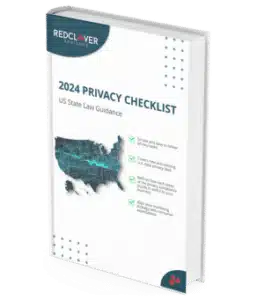If your house is like mine, there are some basic rules in place. Put your shoes and coats away when you get home. Make your bed in the morning. Always leave a note if you use the last of the milk or (more importantly) coffee.
These rules (help) keep everyone on the same page and reduce the inevitable chaos of cohabitating.
But the thing is, these rules only work if they are clearly spelled out. If you expect your child/spouse/housemate to intuit that dirty dishes go in the sink, not the counter, and wet towels in the washer, not the hamper, you’ve got a long road ahead—a long and potentially frustrating road.
So it is with data privacy with your business operations. You may have lots of privacy processes in place, but if they’re not articulated and documented, it’s harder for employees (and anyone who interacts with them) to follow them. Enter the privacy policy.
What is an internal privacy policy?
An internal privacy policy is the part of your privacy program that sets expectations for how your business (and its employees and vendors) will handle the data it collects.
A privacy policy’s job is to lay out how that data is collected, used, and managed and detail the specific rights data subjects have regarding their data. In short, a privacy policy provides your business’ “house rules” for using and sharing data. These rules are especially important as privacy laws proliferate, new definitions of data are introduced, and consumer expectations shift.
(But let’s not just blame it on outside forces! Your business also changes the services or products it offers, the technology it uses, and the data it chooses to collect. Your privacy policy ideally reflects those just as much as it does external factors.)
Remember, a privacy policy does not equal a privacy notice, another important privacy document.
Unlike a privacy policy, your privacy notice is directed to the data subject. It informs them what personal information your business collects and how your business collects, stores, and uses it. It also discloses their rights regarding that data and how to exercise them.
But back to the privacy policy!
Why is it such an important part of privacy programs?
A privacy policy is a core component of an effective privacy program. It serves many purposes, including:
- Create guiding rules for business operations and privacy programs. This is one of the most important reasons for a privacy policy. You can engage in privacy activities all day long, but without a policy in place, it’s hard to keep practices coordinated and goals aligned. Your privacy policy takes all your privacy strategies, principles, and activities and gives them a clear structure. It also provides much-needed transparency to all data users about expectations and responsibilities.
- Ensuring legal compliance with any jurisdictions that apply to your business, such as U.S. state laws or the E.U.’s General Data Protection Regulation (GDPR). Privacy policies may also be required by the Federal Trade Commission. Keeping a privacy policy in line with compliance obligations will help you answer questions like:
- Is it okay to sell data?
- If so, what regulations apply?
- How do we obtain consent?
- How do our activities need to be communicated to data subjects?
- Avoiding costly fines. If your company is found to be in violation of regulations like those listed above, you could find yourself on the hook for serious fines (think $20 million). An internal privacy policy helps to prevent this from happening.
- Building consumer and employee trust. People’s personal data is important to them, and prioritizing consumer trust is a business differentiator in today’s market. Similarly, how you handle employee data can affect employee morale, trust, and your reputation as an employer, both positively and negatively.
What should be included in your internal privacy policy
While privacy policies should be tailored to your business, its operations, and regulatory requirements, a policy typically consists of the following information:
- Data collection practices: what types of personal data are collected and the means by which data is collected. For example, your business might collect employee names, addresses, social security numbers, and banking details for payroll purposes.
- Usage of information: Clear explanation of and parameters for how data is used and by whom. Maintaining an up-to-date data inventory is vital in accurately describing this.
- Data sharing and disclosure: This section identifies the circumstances under which data may be shared with third parties.
- Rights of the data subjects: what the rights that individuals have concerning their personal data, such as the right to access, rectify, or delete their information.
- Policy enforcement and compliance: how is compliance monitored? What measures are taken if employees, vendors, or other data users don’t follow the standards laid out in the policy?
- Data security measures: technical and organizational measures to protect data. These can range from data encryption to access control procedures and regular security training for staff.
Note that internal privacy policies may be needed for different departments. For example, a separate policy may be required for the human resources department that covers the collection and usage of personal data related to employees. This ensures that all departments are aware of their responsibilities and obligations regarding protecting personal data.
Three tips for an effective privacy policy
Having a solid privacy policy goes beyond ticking all the boxes above. Here are a few tips that can turn yours from meets-the-bare-minimum to gold star:
- Use a data inventory to inform your policy: A data inventory is essential for privacy compliance and is a best practice, even if not mandated for your business. Track data records from collection to deletion to understand what you’re collecting, why, where it’s stored, how long, and who has access. Doing this will help you create the most accurate, up-to-date privacy policy possible.
- Keep it simple: Yes, this is an internal document, but it’s doubtful that your data users want to read pages of legalese and jargon. Use easy-to-understand language to explain the hows, whys, whos, and wheres of your data privacy program. Consider creating a visual, easy-to-read section as a “too long/didn’t read” synopsis of your privacy policy.
- Make sure to include opt-out/instructions: Depending on applicable privacy laws, allow consumers to opt-in or opt-out of data collection, processing, sharing, or selling. Provide instructions for employees on how consumers can exercise their rights to avoid frustrated consumers and possible compliance violations.
Who needs to have an internal privacy policy?
You may have gotten to this point and said, “Okay. That all makes sense. But does my business really need to go through all that?”
Here’s the thing: when businesses ask, “Do we need to have a privacy policy,” they’re asking, “Are we required to have a privacy policy?”
The requirement to have privacy policies depends on what jurisdiction(s) your company falls under. Businesses are required to comply with the GDPR if they are located in the EU or do business with those residing in the EU.
In the U.S., there is no overarching federal modern data privacy law that applies to all businesses and provides consistent guidance on how to handle personal information. Instead, we have an ever-expanding smorgasbord of privacy regulations; in 2024 alone, five new data privacy laws will come into effect (on top of the five already that became effective in 2023):
- Washington My Health My Data Act
- Oregon
- Connecticut (as an amendment to the existing state law)
- Texas
- Montana
For more information on state privacy laws, our state privacy law map provides a comprehensive overview of U.S. data privacy legislation.
Privacy Checklist
Check out our Privacy Checklist for tips and practical guidance to establish a sustainable compliance program.

You don’t have to figure it out on your own
Whether you are just starting on your privacy policy or you’re looking to overhaul your existing policy, it can be a big task. Third-party experts are an excellent resource for building a sustainable privacy program that works for your business.
Schedule a free consultation with Red Clover Advisors today to explore how your team can build a privacy program that works for you.


